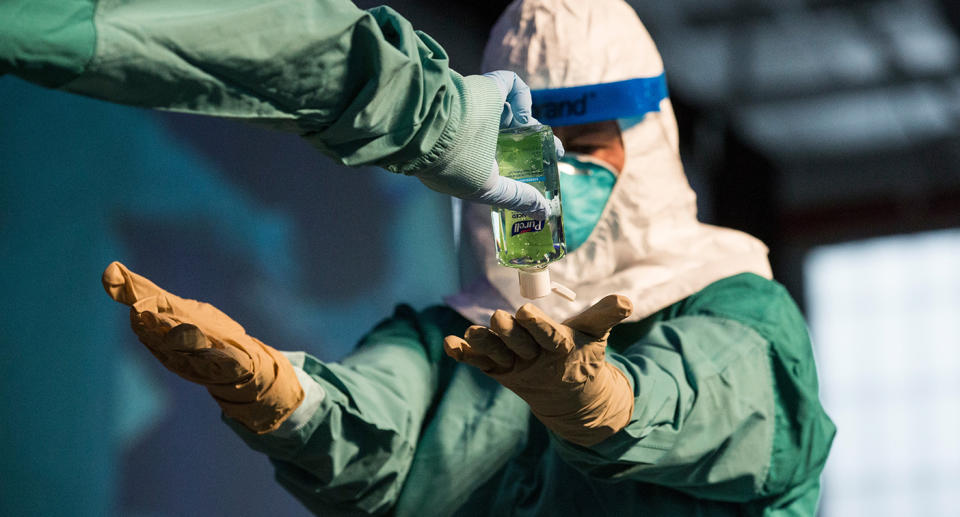Pharmacy defends $19.99 cost for hand sanitiser amid panic-buying
Coronavirus panic-buying continues to strip products like hand sanitiser from supermarket shelves, prompting some independent stores have been accused of taking advantage of consumer demand by increasing prices.
Amid the coronavirus pandemic, a Priceline store in Sydney was recently revealed to be selling 250ml bottles of Instafresh hospital grade instant hand sanitiser for $19.99.
Next to the product was a note telling customers that due to “high demand and low stock availability” the pice had increased on some items.
When contacted, Priceline told Yahoo News Australia the information on the note was incorrect and the higher than usual price of the hand sanitiser was due to the hospital grade formula.
“This sanitiser may seem expensive, however, we can confirm this is in line with retail selling prices given the hospital grade nature of the product,” a Priceline spokesperson said.
The location has since removed the sign and placed stock behind the counter to ensure customers receive an explanation as to why the pice is higher than standard hand sanitiser.
“The store will now sell these items behind the counter and will also ensure each enquiry comes with a Pharmacist consultation to ensure full clarity of purchase, including why this particular item is more expensive than normal sanitiser,” the spokesperson said

Coronavirus panic buyers mocked with ads for 'very rare' essentials online
Melbourne shop spotted selling toilet paper at huge mark up as panic buying continues
Panicked shoppers buy up 'three Christmases worth' of goods at Coles
Should hospital grade sanitiser be available to the public?
Customers aren’t the only people feeling the pinch, healthcare services are also starting to run low on supplies.
Most healthcare workers are on the front line and likely to be directly affected by coronavirus, so should hospital grade sanitiser be reserved for health care workers?
Expert in health ethics, pandemic planning and moral issues, Dr Connal Lee from the University of South Australia suggests that in times of dwindling supplies, perhaps private business isn’t the best way to decide who has access to what.
There’s no need to stockpile hand sanitiser. The Aqium facility in Melbourne has stopped exporting & is pumping out 90,000 bottles a day - 5 times its forecast levels! It’s just one of many Aussie businesses stepping up during the outbreak of coronavirus.https://t.co/BGMoPesRj1 pic.twitter.com/y4a49k3cX6
— Karen Andrews MP (@karenandrewsmp) March 23, 2020
“One school of thought might be that sellers are within their rights to charge whatever people are willing to pay,” Dr Lee told Yahoo News Australia.
“Another school of thought is that need should determine the allocation of scarce resources - so these resources should be going to those needed to help others like health workers or to those who are vulnerable like those likely who suffer greatly from infection or those who are in close proximity to the vulnerable,” Dr Lee said.
‘Maximise resources while treating people fairly’
Even if manufacturing costs have risen slightly, Dr Lee suggests keeping prices consistent is a way to inspire customer loyalty and bodes well from a big business point of view, providing good public relations for the company.

“These companies can likely afford to lose some money at the moment on goods like hand soap and regardless of the benefits to their image or business they can be doing something to help,” Dr Lee said.
Dr Lee also suggests that the best way to distribute in demand necessities fairly is to give them where they are most needed.
“They shouldn't be going to those who can afford them, as the resources may be better used elsewhere, we want to maximise resources while treating people fairly. This would mean giving away the hand sanitiser as a civic duty, which is something I suspect the public would support at a time like this,” Dr Lee explains.

Should hand sanitiser distribution be regulated?
Dr Lee said the high prices that are beginning to be seen in mainstream stores could create a sense of panic and rivalry among customers, and products like hand sanitiser would be better distributed when profit isn’t the main concern.
“There is a strong case for saying that distribution of the goods that are now in short supply needs to be taken over and administered by a centralised expert body.”
And Dr Lee has a suggestion for who should take over the distribution.
“Some may argue that this should be in the hand of the government or public health authorities rather than private businesses who lack the expertise to determine how to distribute goods in a way that maximises health.”
Do you have a story tip? Email: newsroomau@yahoonews.com.
You can also follow us on Facebook, Instagram and Twitter and download the Yahoo News app from the App Store or Google Play.



